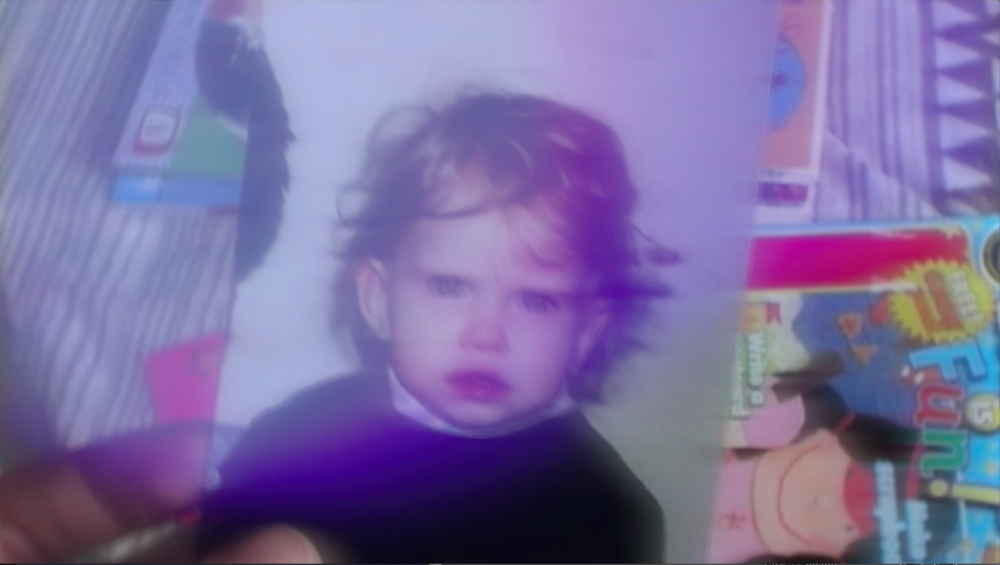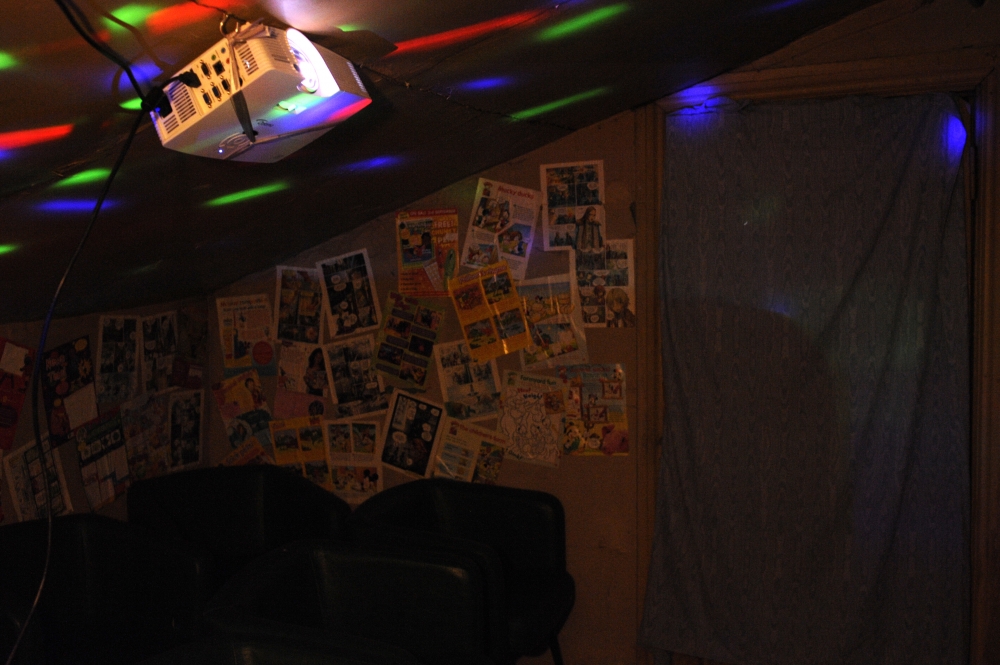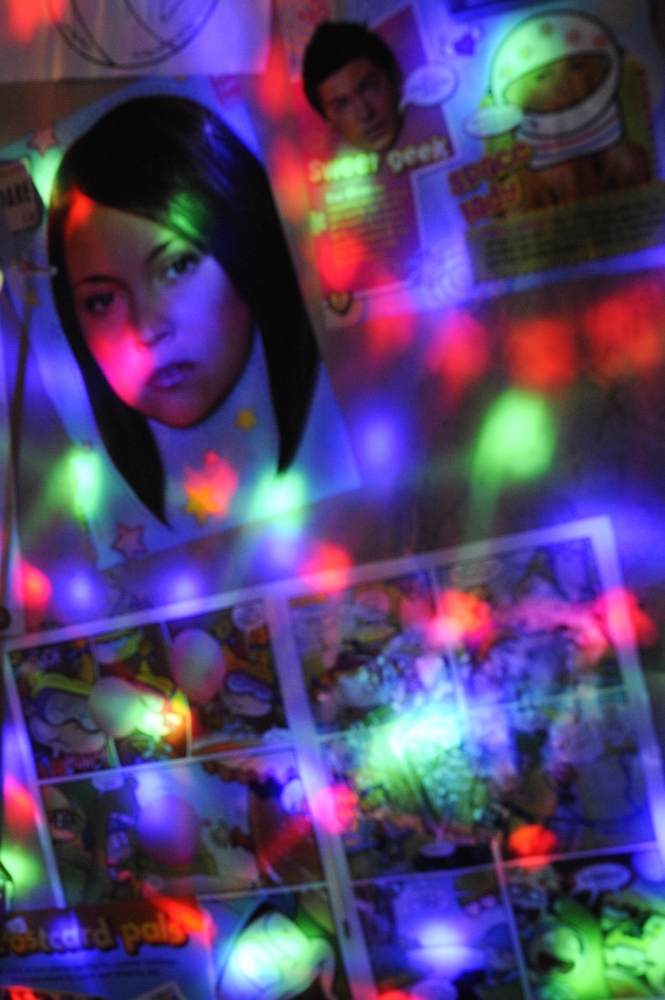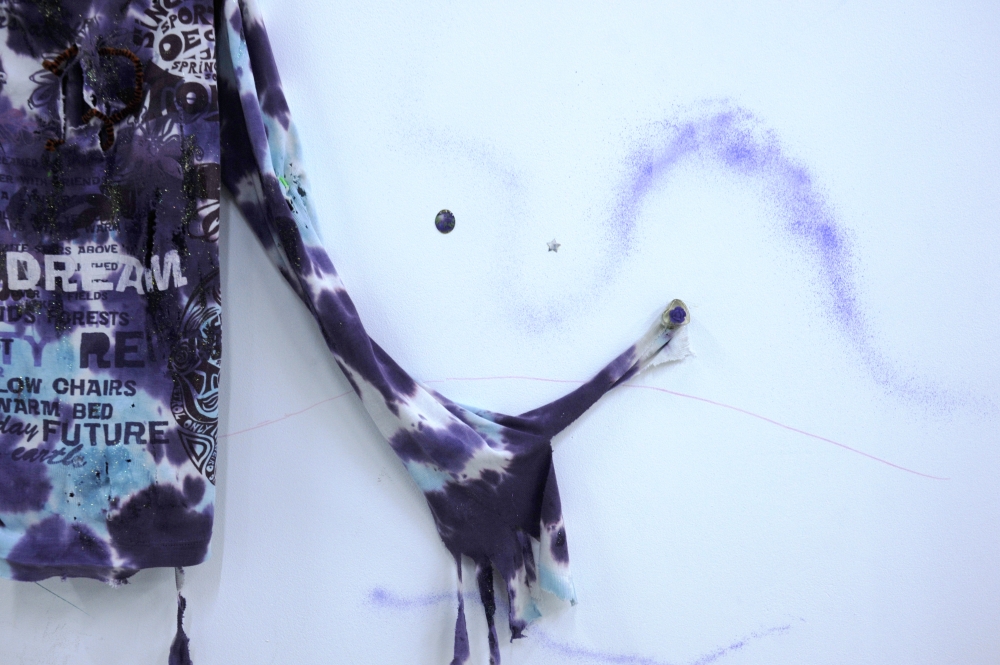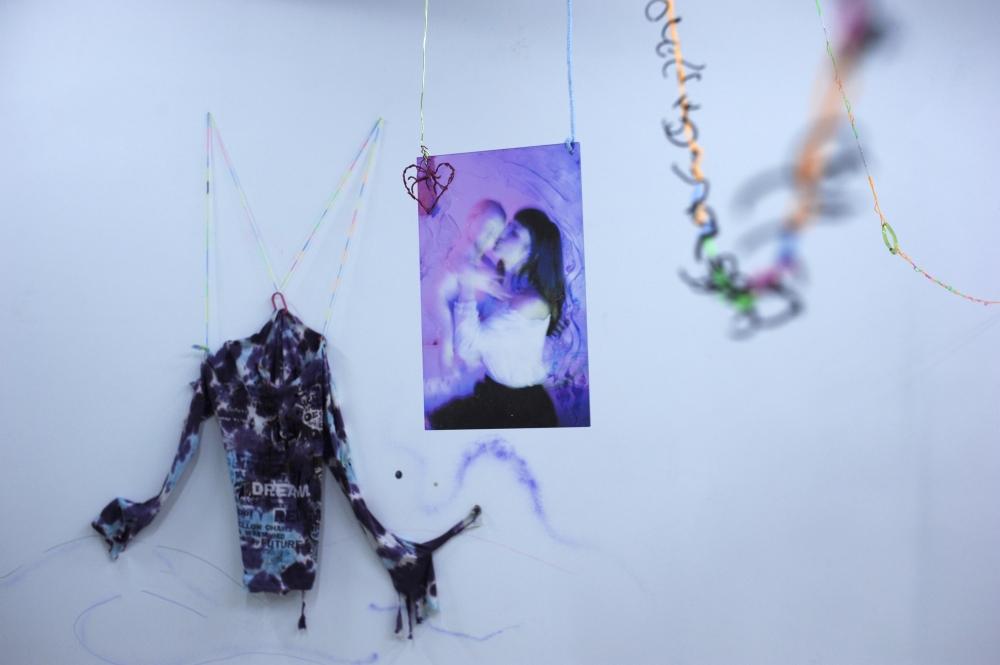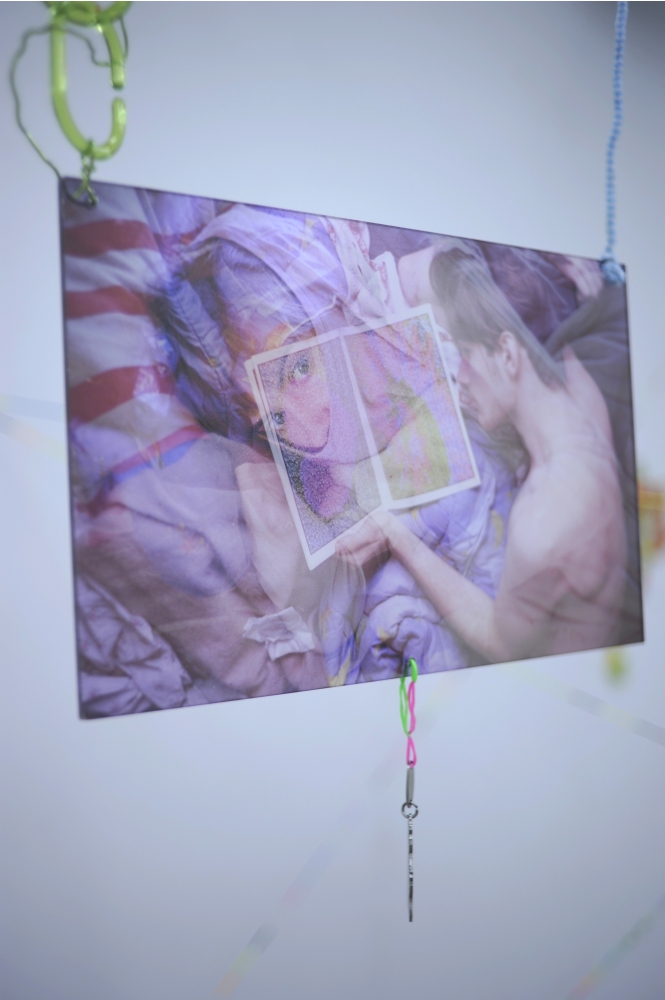Littering the space like components of a complex extruded machine, a web of coloured cords cross the walls and through the standing room of the small white cube at Moscow’s ISSMAG gallery. It’s a part of Lisa Chukhlantseva’s solo exhibition, You Are Like Me in Youth, Only Better, which ran February 21 to March 13, where on closer inspection the cords are made from rubber loom bands — those coloured rubber bands used mainly by kids to weave into jewellery. They’re given to visitors like an elapsed playground currency, a memorial or reminder. In this paradigm, the exhibition wanders the wasteland of a confused online generation through a living nostalgia of proximity and the material sadness of participation.
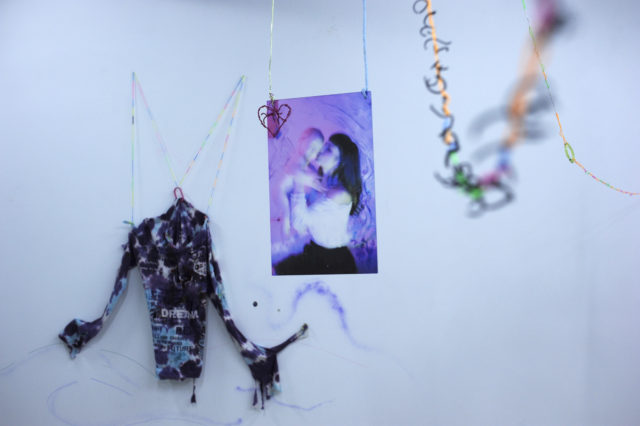
There are other loom bands that become a sprung hanging system, barrier and real-time network for a series of photographic works, found items, drawing and sculptural arrangements by the Moscow-based artist. On the wall to the left hangs a tie-dye fleece jumper with printed words such as ‘dream’ and ‘future.’ In a semiotic miasma of typefaces, meaning is superficial, as is the normalising demeanor of this cut price clothing and its labour. Stretched in gesture and display, the violence of this cheap sweater is hypnotic. Across the room, a plasterboard section leans against the wall. It contains scraps, keepsakes, faint text in coloured pencils and a photograph of two children making angels in deep snow. A wire pentagram hangs from a loom cord that cuts through the sight-lines of the piece.
The press release describes in detail Chukhlantseva’s term, ‘Angels anonymous.’ Created by the artist, it represents a 90s/00s generation of teenagers in social networks and Instagram subscriptions, preferring pseudo-nostalgia for the 80s/90s to a reality the artist describes as ‘contradictory and confusing.’ This term is detailed in the exhibition through a series of photographs mounted on clear acrylic that hang in the installation. The images’ content and composition is iconic and emotive but too dreamlike to be read as a document. Images of childhood, family and emotional proximities are turned over to us, a gutsy emptying-out that is stopped short of full immersion by saccharine filters, existing in the as described “soap bubble of escapism” of Chukhlantseva’s angels in the text. The artist manages to co-opt the distance between reality and dream that is seamlessly narrowed for us in user production/consumption relations of online platforms and images in a timeline.
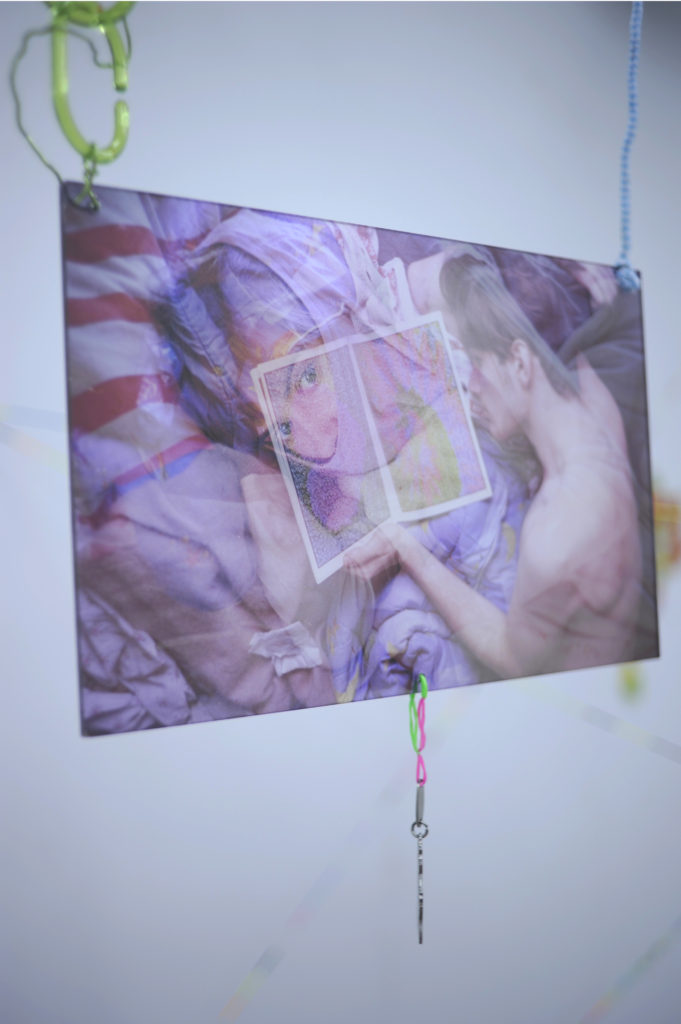
Accessed via a metal ladder, You Are Like Me in Youth, Only Better continues through a ceiling aperture into the gallery’s attic. Unlike the white walls below, the dingy roof space has been renovated by Chukhlantseva into a domestic den, which potentially references the alternative reality at her Dascha, a type of second/holiday home popular with Russian families. The press release describes time spent with their older sister and grandmother away from urban life in their Dascha. Chukhlantseva writes of these times: “I remember everything too well to write my memoirs, because it has been so recent, and we continue fooling around like this.” The attic screens a 10-minute film ‘Eternal Warmth’ projected on the only flat wall available. The remainder of the space is pasted with children’s magazines scanned by a rotating disco light. Translucent footage of Chukhlantseva’s artworks transition into a dialogue of her grandmother laying flowers on a memorial.
In ‘Eternal Warmth,’ Chukhlantseva asks her grandmother, “when will there be a monument for us?” to which the grandmother replies, “why not, you just have to deserve it. A daring act needs a monument.” In contrast to their family Dascha, this attic zone turns a melancholic, critical lens onto relationships, both intimate and transient, to question the legitimacy of their shared reality and practices.
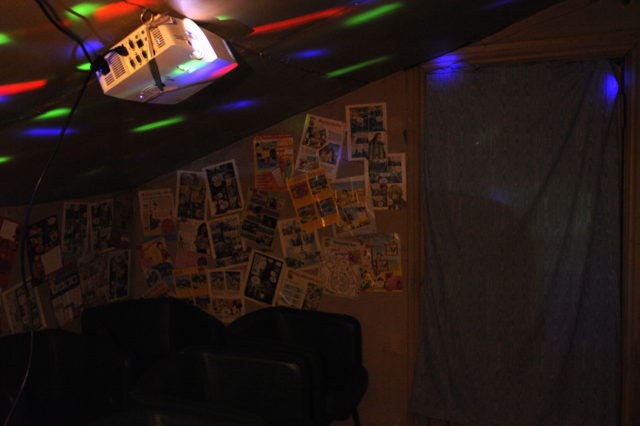
As a second part to the gallery exhibition, the artist has produced an online exhibition for the VKontakte social media platform. This was launched specifically on the last day of winter, February 28. Chuklantseva’s work optimises on the ambiguity of IRL. The show documents a reality where alternative geographies of the countryside Dascha, physical proximity, and the soul searching of anonymous angels are expressed by a generation as their cultural tools and centres of inquiry. But these spaces are commodified before they are lived and utilised, codified by a grey ideological reality and earlier generations as a harmless fairy-tale.**
